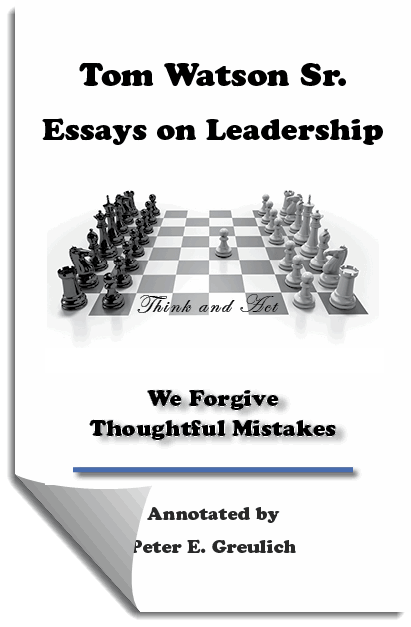A CEO Tradition of Forgiving Mistakes
We Forgive Thoughtful Mistakes
Tom Watson Sr. possessed honorable beliefs, deep convictions and a desire to speak to a man’s heart but he lacked an orator's elegance and stage presence. Watson Sr. performed off-stage; his actions more than his words changed opinions and produced an unshakeable loyalty that touched the IBMer‘s heart.
This is one of those off-stage stories.
Handed down by tradition.
This is one of those off-stage stories.
Handed down by tradition.
A Salesman's Mistake
IBM had survived The Great Depression. Gambling on a post war boom, Watson Sr. had maintained IBM’s employment levels by increasing inventories when there was little demand. Excess machinery and parts crowded basements and filled every nook-and-cranny of Endicott's warehouses.
Some on the board of directors, because of this, were lobbying to remove Watson as IBM's President. He needed these inventories sold.
A very large government bid, approaching a million dollars, was on the table. The IBM Corporation—no, Thomas J. Watson Sr.—needed every deal. Unfortunately, the salesman failed. IBM lost the bid. That day, the sales rep showed up at Mr. Watson’s office. He sat down and rested an envelope with his resignation on the CEO’s desk. Without looking, Mr. Watson knew what it was. He was expecting it.
He asked, “What happened?”
The sales rep outlined every step of the deal. He highlighted where mistakes had been made and what he could have done differently. Finally he said, “Thank you, Mr. Watson, for giving me a chance to explain. I know we needed this deal. I know what it meant to us.” He rose to leave.
Tom Watson met him at the door, looked him in the eye and handed the envelope back to him saying, “Why would I accept this when I have just invested one million dollars in your education?”
Some on the board of directors, because of this, were lobbying to remove Watson as IBM's President. He needed these inventories sold.
A very large government bid, approaching a million dollars, was on the table. The IBM Corporation—no, Thomas J. Watson Sr.—needed every deal. Unfortunately, the salesman failed. IBM lost the bid. That day, the sales rep showed up at Mr. Watson’s office. He sat down and rested an envelope with his resignation on the CEO’s desk. Without looking, Mr. Watson knew what it was. He was expecting it.
He asked, “What happened?”
The sales rep outlined every step of the deal. He highlighted where mistakes had been made and what he could have done differently. Finally he said, “Thank you, Mr. Watson, for giving me a chance to explain. I know we needed this deal. I know what it meant to us.” He rose to leave.
Tom Watson met him at the door, looked him in the eye and handed the envelope back to him saying, “Why would I accept this when I have just invested one million dollars in your education?”
|
Many authors build their stories on Watson Sr.'s volatile temper or authoritarian manner; he had one and, at times, he could be. Like most of us he was a human being with faults. His temper though, was reserved for those in management that failed to think. Stories, like the one above of Watson Sr.'s support of the common salesman, surrounded his leadership. His actions, like a great orator's words, were of a higher type. He did not need oratory, as we were his story tellers. His stories were our spoken tradition.
As with any unwritten tradition, over the decades, a story’s who, what and where will change with every telling. The theme of this one story, though, never changed: At IBM we forgive thoughtful mistakes. Of course, to clarify, it probably needs to be said, "Don't fail to THINK before making a decision, don't make the same mistake twice, and never - - no never - - make a mistake of integrity or character." Peter E. Greulich, Volume III of Tom Watson Sr. Essays on Leadership: We Forgive Thoughtful Mistakes |
Free download available
|

